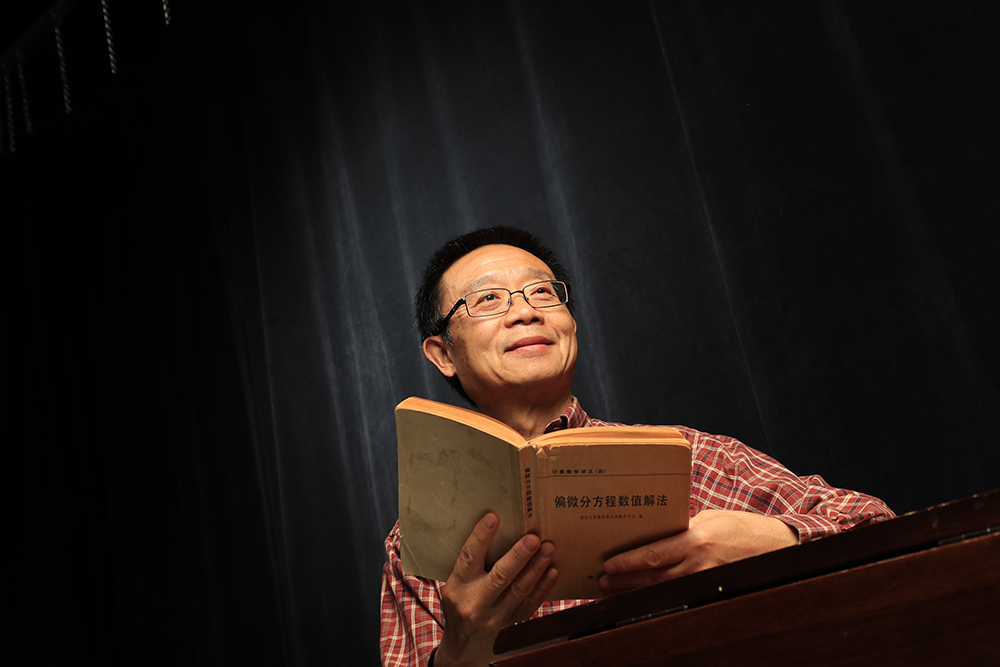Applied Mathematics, From Engines to Outer Space

Tim Sheng’s title reads mathematics, but his impact is multi-disciplinary. Across Baylor University and at each stop in his decorated career, he has applied his expertise to projects as varied as combustion engines to outer space.
“My way of thinking, as an applied mathematician, is that you want to see something beyond theory,” Sheng says. “I want to make things happen, to be part of things that are useful and helpful and to discover things that we never knew before.”
Qin “Tim” Sheng, Ph.D., serves as professor of mathematics and faculty member of Baylor’s Center for Astrophysics, Space Physics and Engineering Research (CASPER). He has served in the National Science Foundation Panel Board for for seven consecutive years, and his research, which has been supported by the United States Air Force Research Laboratory and Department of Defense, demonstrates the range of uses for his particular area of interest—partial differential equations (PDE).
To solve complex problems in the natural world, scientists rely on PDEs to account for the challenge’s wide array of variables. PDEs account for the function of several variables relating to partial derivatives. To address challenges in modeling, for instance, a combustion engine, Sheng focuses at nonlinear equations to solve numerically, making sure the model obeys the physical properties of the object in question. Such problems require high-powered computers and programming skills to solve.
“There are many applications for partial differential equations,” Sheng says, “which are the mathematic side of the story found in natural phenomena and in engineering—fluid dynamics, airplane engines, energy conservation, laser optics and…in space research, to study forces like a black hole. I’ve had many partners and working collaborators from fields in engineering, physics, and medicine. There are an infinite number of cases to study and problems to solve.”
CASPER is a space research center at Baylor comprised of research groups in theoretical and experimental physics. Sheng serves on CASPER’s Gravity, Cosmology and Astroparticle Physics Division, and has provided mathematical computer simulations that aid the group’s efforts to explain forces across the solar system and throughout the universe.
“This is important, because if we talk about space travel in the future, we cannot just ignore forces, like a black hole, for instance,” Sheng says. “My role is solving equations, seeing whether a solution exists or not and examining them in multiple dimensions.”
Closer to home, combustion engines provide another application for his work. Because perfection in products engineered by humans is elusive, PDEs provide opportunities to study potential problems in cost-effective ways that promote efficiency across a variety of aspects of research, development, and issues that may arise in the product’s operation. For instance, an invisible air bubble can form in a combustion engine and cause outsized problems ranging from reduction in the life of the engine to external cracks to more dangerous challenges commensurate with the combination of fuel and power. Sheng and other applied scientists provide comprehensive procedures that simulate various outcomes of bubbles, or other imperfections, throughout different locations in the engine. The results are products that are potentially safer and require less capital to maintain.
“If you have to conduct a real experiment that requires letting the engine explode, there will be a huge cost in money and time,” Sheng says. “But we can program an equation analyzing the problem, monitor it and uncover phenomena without destroying the product, speeding up the process dramatically, and allowing us to also promote efficiency and performance.”
Sheng came to Baylor in 2005 and rapidly helped grow the math department’s Ph.D. program. Together with collaborators, Sheng's future research plans extend into the new territory of deep machine learning and artificial intelligence with potential applications of COVID-19 pandemic controls. As Baylor pursues Tier 1 research recognition, interdisciplinary research like that conducted by Sheng will enhance projects that solve problems and grow Baylor’s research enterprise through scholarship marked by quality, visibility and impact.